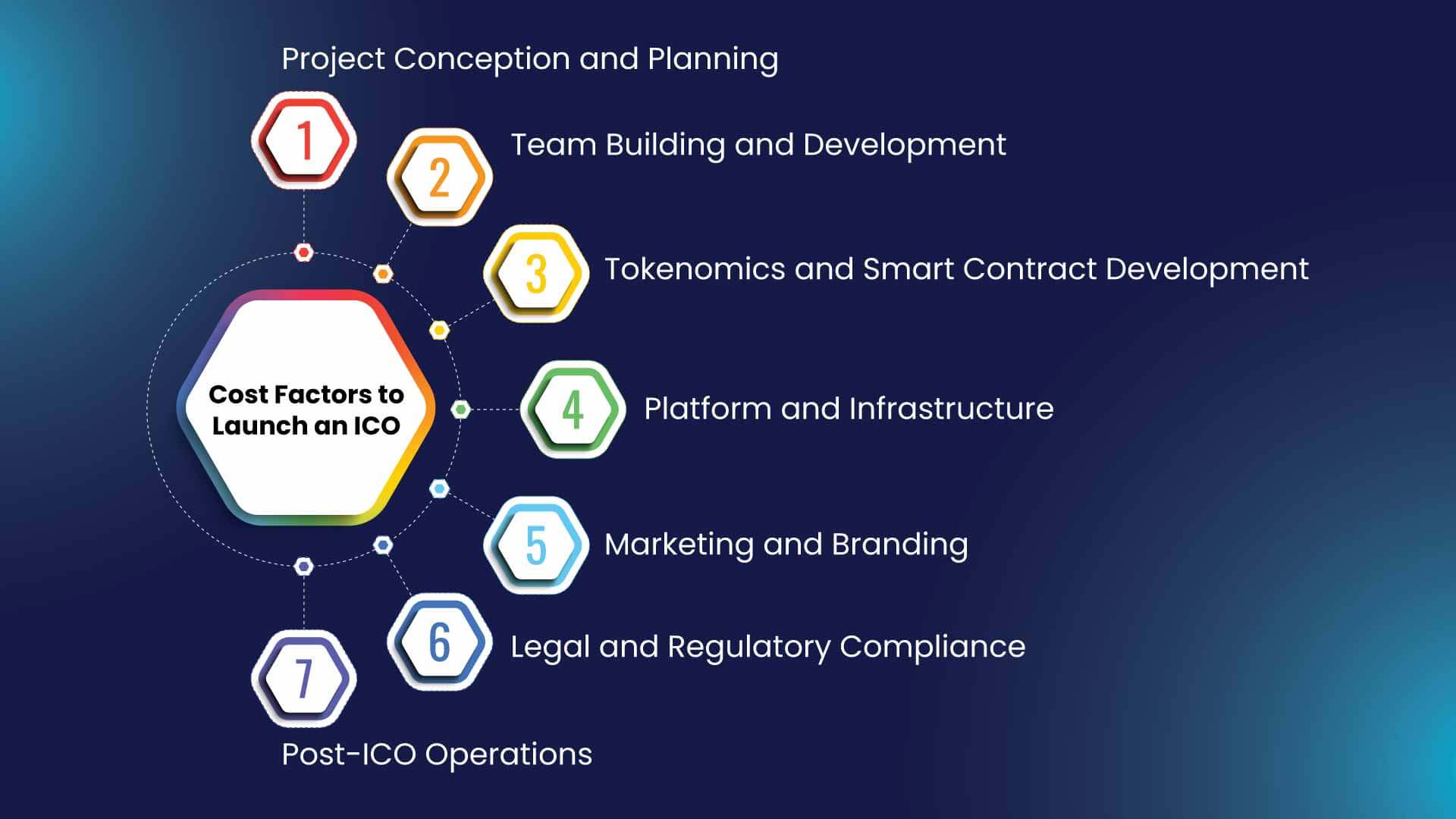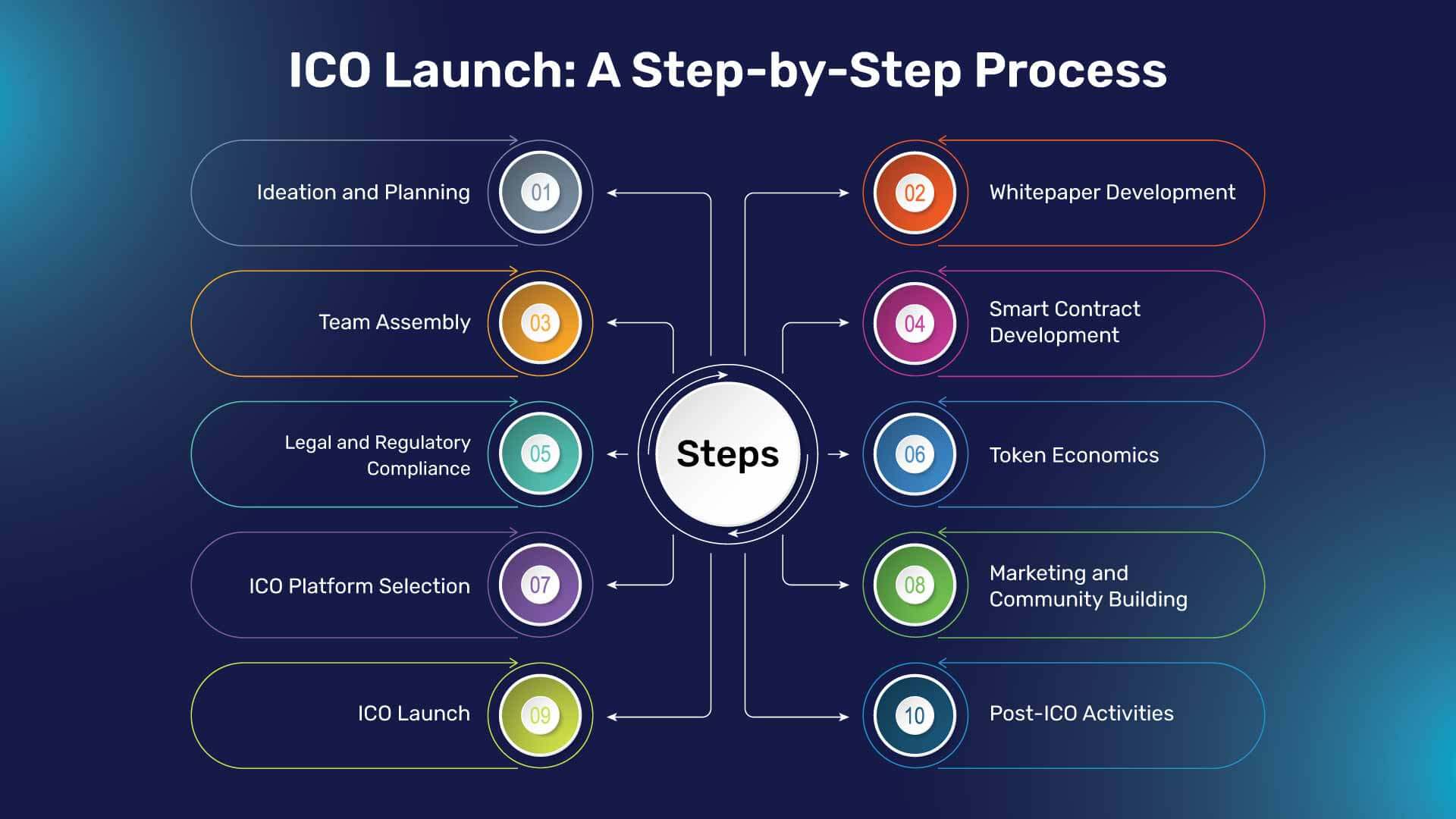An Initial Coin Offering (ICO) is a fundraising method used by cryptocurrency projects to raise capital. It's similar to an Initial Public Offering (IPO) in traditional finance, where companies sell shares to raise money. However, instead of selling shares, companies issuing ICOs sell cryptocurrency tokens.
But how much does an ICO cost?
The answer depends on many factors, including project complexity, team size, marketing efforts, and regulatory compliance. The average cost of launching an ICO ranges from $40,000 to $200,000.
Understanding the cost implications is crucial for business executives considering ICO development. This blog post delves into the key factors influencing ICO development costs, providing a detailed breakdown and insights to help you make informed decisions.
Let's check out cost factors in detail.
Factors Affecting ICO Cost

Initial Coin Offering budget, ranging from a modest $40,000 to a substantial $200,000 or more. Several key factors, including the project's complexity, the team's experience level, and the chosen development approach, heavily influence this variance.
Here's a detailed cost breakdown for ICO projects along with estimated ranges:
1. Project Conception and Planning:
ICO development costs include the conceptualizing the project idea, defining its core value proposition, and conducting initial market research to assess its potential.
- Market Research and Feasibility Study: Assessing market potential, identifying target audience, and evaluating competitive landscape. Estimated Cost: $5,000 - $15,000+
- Business Plan Development: Creating a comprehensive business plan outlining the project's goals, strategy, financial projections, and tokenomics model. Estimated Cost: $5,000 - $15,000+
- Legal and Regulatory Counsel: Ensuring compliance with relevant securities laws and regulations, conducting legal audits, and preparing necessary legal documentation. Estimated Cost: $5,000 - $25,000+
2. Team Building and Development:
Identifying and recruiting key team members, including developers, designers, blockchain experts, and legal advisors, to form a strong foundation for the project.
- Hiring or Outsourcing Development Team: Assembling a skilled team of developers, designers, blockchain experts, and project managers. Estimated Cost: $50,000 - $200,000+ (varies based on team size, experience, and location)
- Legal and Compliance Team: Hiring legal experts to ensure regulatory adherence, conduct KYC/AML checks, and manage legal documentation. Estimated Cost: $5,000 - $25,000+
3. Tokenomics and Smart Contract Development:
For ICO token development, firstly define the core principles of the token economy, including token utility, distribution mechanisms, and governance model, to create a sustainable and attractive investment opportunity.
- Tokenomics Design: Defining token supply, distribution mechanisms, vesting schedules, and token utility. Estimated Cost: $5,000 - $20,000+
- Smart Contract Development: Creating the core functionality of the token on the blockchain, including token issuance, transfer, and burning mechanisms. Estimated Cost: $10,000 - $50,000+ (depending on complexity)
- Security Audits: Verify the smart contract's security and integrity, identify vulnerabilities, and implement security measures. Estimated Cost: $5,000 - $20,000+
4. Platform and Infrastructure:
Selecting or developing a robust platform to support the ICO and ensure smooth operations, a key factor affecting ICO costs.
- ICO Platform Selection or Development: Choosing a platform to manage token sales or building a custom platform for greater flexibility and control. Estimated Cost: $5,000 - $20,000 (platform fees) or $50,000+ (custom development)
- Blockchain Network Fees: Transaction fees on the chosen blockchain network, such as Ethereum or Binance Smart Chain. Estimated Cost: Varies based on network usage and gas prices.
Pro Tips: -Launching Initial Coin Offerings involves a company issuing new cryptocurrencies (tokens) to investors in exchange for existing ones like Bitcoin or Ethereum. This fundraising method, heavily influenced by blockchain ICO launch costs, can grant token holders access to services, ownership, or voting rights.
5. Marketing and Branding:
Developing a compelling brand narrative and creating high-quality marketing materials to attract investors and build a strong brand reputation.
- Brand Identity Development: Creating a solid brand identity, including logo design, website development, and marketing materials. Estimated Cost: $5,000 - $20,000+
- Marketing and PR Strategy: Developing and executing a comprehensive marketing strategy, including social media marketing, content marketing, email marketing, and public relations. Estimated Cost: $10,000 - $100,000+ (depending on the scope of the campaign)
- Community Building: Engaging with the community through social media, forums, and events to foster a strong community and generate interest. Estimated Cost: $5,000 - $20,000+
6. Legal and Regulatory Compliance:
Ensuring compliance with relevant securities laws and regulations to avoid legal issues and maintain a strong reputation.
- KYC/AML Procedures: Implementing Know Your Customer and Anti-Money Laundering procedures to comply with regulatory requirements. Estimated Cost: $5,000 - $15,000+
- Legal Documentation: Preparing legal documents, such as whitepapers, terms of service, privacy policy, and investor agreements. Estimated Cost: $5,000 - $20,000+
Remember: - The Cost of Launching an ICO can be significantly impacted by the complexity of these legal requirements. Engaging experienced legal counsel to draft and review these documents is essential to minimize legal risks and ensure compliance with relevant regulations. The blockchain ICO launch cost can vary widely depending on the jurisdiction, the complexity of the project, and the level of legal expertise required.
7. Post-ICO Operations:
Implementing strategies for long-term project growth, community engagement, and token value appreciation.
- Token Distribution and Management: Distributing tokens to investors, managing token supply, and implementing token governance mechanisms. Estimated Cost: Ongoing costs for platform fees, team management, and potential legal and compliance expenses. (Estimated range: $5,000 - $20,000 per year)
- Project Development and Execution: Allocating funds for project development, operations, and ongoing marketing and community engagement. Estimated Cost: Varies based on project scope and timeline. (Estimated range: $50,000 - $200,000 per year)
Remember that these are estimated costs breakdown for ICO projects, and the actual expenses can vary significantly depending on various factors such as project complexity, team size, geographic location, market conditions, and regulatory environment.
It's crucial to conduct thorough research and consult with experts to obtain accurate cost estimates for your specific ICO project. Now that you know how various factors, including the estimated cost of Launching an ICO, can impact your budget, let's explore the step-by-step process and strategies for optimizing your ICO launch budget.
Step-by-Step Process to Launch an ICO

Launching an Initial Coin Offering (ICO) is a complex process that requires careful planning and execution. Here's a step-by-step guide to help you navigate the process:
1. Ideation and Planning:
Define your project's core idea, goals, and target market, and subsequently, create a detailed project roadmap outlining key milestones and timelines.
2. Whitepaper Development:
Write a comprehensive whitepaper that clearly explains your project's vision, technology, team, token economics, and roadmap. Ensure the whitepaper is well-structured, easy to understand, and free of technical jargon.
3. Team Assembly:
Recruit a skilled team of blockchain developers, marketers, legal experts, and financial advisors, and clearly define the roles and responsibilities of each team member.
4. Smart Contract Development:
Design and develop a secure smart contract to manage token issuance, distribution, and governance. Conduct thorough audits to identify and address potential vulnerabilities in the smart contract.
5. Legal and Regulatory Compliance:
Consult with legal experts to understand the regulatory landscape in your target jurisdiction, and ensure compliance with securities laws, anti-money laundering regulations, and other relevant laws.
6. Token Economics:
Define your token's utility, distribution model, and economic incentives in ICO token development. Consider factors such as token supply, token distribution, token vesting schedules, and token development pricing.
7. ICO Platform Selection:
Choose a reputable ICO platform that offers security, transparency, and compliance features. Consider factors such as fees, user experience, and support services.
8. Marketing and Community Building:
Develop a comprehensive marketing strategy to attract investors and build a strong community. Utilize various channels, including social media, content marketing, email marketing, and public relations.
9. ICO Launch:
Launch your ICO on the chosen platform, adhering to all legal and regulatory requirements. Monitor the token sale closely and address any issues that may arise promptly.
10. Post-ICO Activities:
Continue developing your project and delivering on your promises. Maintain open communication with your token holders and the broader community. Explore potential partnerships and collaborations to expand your project's reach.
By following these steps and staying updated on the latest regulations and best practices, you can increase your chances of a successful ICO launch.
Challenges and Considerations in Launching an ICO
While ICOs offer significant potential for fundraising and innovation, they also present several challenges that startup executives should be aware of:
Regulatory Hurdles:
- Evolving Regulatory Landscape: The regulatory environment for ICOs is constantly evolving, making it challenging to keep pace with changing rules and regulations.
- Jurisdictional Differences: Different countries have varying regulatory frameworks, which can complicate the process of launching a compliant ICO.
- Security Token Regulations: Classifying tokens as securities can trigger stringent regulatory requirements, including investor accreditation and disclosure obligations.
Market Volatility and Investor Sentiment
- Price Fluctuations: The cryptocurrency market is highly volatile, and token prices can fluctuate significantly, impacting the success of an ICO.
- Investor Sentiment: Negative market sentiment, regulatory uncertainty, and economic factors can negatively impact investor interest and ICO token development valuations.
Technical Challenges
- Smart Contract Security: Developing secure and auditable smart contracts is crucial to prevent hacks and exploits.
- Scalability: Ensuring that the blockchain platform can handle a large number of transactions and users is essential for long-term success.
- Interoperability: Integrating with other blockchains and protocols can be complex and requires careful technical considerations.
Team and Operational Challenges
- Building a Strong Team: It is essential to assemble a talented team with expertise in blockchain technology, business development, and marketing.
- Managing Token Economics: It is crucial to design a sustainable token economy that incentivizes long-term growth and adoption.
- Post-ICO Operations: Developing a robust post-ICO strategy, including product development, community building, and governance, is essential for long-term success.
By carefully considering these challenges and taking proactive steps to mitigate risks, business executives can increase the chances of a successful ICO development.
Common ICO Scams and How to Protect Your Investment
As a business executive, it's crucial to be aware of the risks associated with ICOs. While the potential rewards can be significant, the dangers of falling victim to scams are also substantial.
Here are some common ICO scams to watch out for:
- Rug Pulls: In a rug pull, the project team abruptly abandons the ICO consultation project, leaving investors with worthless tokens.
- Exit Scams: Similar to rug pulls, exit scams involve the team gradually selling off their tokens, driving down the price and defrauding investors.
- Pump and Dump Schemes: Scammers manipulate ICO token development prices through coordinated buying and selling, artificially inflating the price before dumping their holdings.
- Phishing Attacks: Hackers may use phishing emails or fake websites to steal sensitive information, such as private keys.
- Fake Team Members: Scammers may create fake team profiles to deceive investors and make the project appear more legitimate.
To protect your investment, consider the following:
- Thorough Due Diligence: Conduct rigorous research into the project's team, technology, and business model.
- Verify Team Members: Use social media and professional networking sites to verify the team's identities and experience.
- Scrutinize the Whitepaper: Ensure the whitepaper is well-written, detailed, and free of inconsistencies.
- Audit Smart Contracts: Hire a reputable security firm to audit the project's smart contracts for vulnerabilities.
- Diversify Your Investments: Spread your investments across multiple projects to mitigate risk.
- Use Secure Wallets: Store your tokens in secure, hardware-based wallets.
- Stay Informed: Keep up-to-date with the latest news and trends in the crypto industry.
By following these guidelines and working with reputable partners, you can minimize the risks associated with ICO investments.
Real-World Case Studies: Recent ICO Success Stories
While the ICO market has seen its ups and downs, several projects have successfully raised significant funds and delivered on their promises. Here are 5 notable examples:
Filecoin:
- Innovative Solution: A decentralized storage network that aims to make data storage more affordable and accessible.
- Key Achievements: Raised over $250 million in its ICO, successfully launched its mainnet, and has become a leading decentralized storage solution.
Chainlink:
- Innovative Solution: A decentralized oracle network that provides real-world data to smart contracts.
- Key Achievements: Raised over $32 million in its ICO, established itself as a crucial infrastructure for the blockchain industry, and has partnered with numerous projects.
Dfinity:
- Innovative Solution: A decentralized internet computer platform that aims to revolutionize the way applications are built and deployed.
- Key Achievements: Raised over $100 million in its ICO, made significant progress in developing its platform, and has attracted a strong developer community.
Tezos:
- Innovative Solution: A self-amending blockchain platform that aims to provide a more secure and efficient way to build decentralized applications.
- Key Achievements: Raised over $232 million in its ICO, successfully launched its mainnet, and has attracted a growing number of developers and users.
Cosmos:
- Innovative Solution: A network of independent blockchains that can communicate and exchange values with each other.
- Key Achievements: Raised over $17 million in its ICO, successfully launched its mainnet, and has become a leading interoperability solution for the blockchain industry.
Key Takeaways from These Success Stories:
- Strong Technology and Vision: A solid technological foundation and a clear vision for the future are crucial for a successful ICO.
- Experienced Team: A talented and experienced team can significantly increase the chances of an ICO's success.
- Robust Community: Building a strong and engaged community can generate significant buzz and attract investors.
- Clear Tokenomics: A well-defined tokenomics model can attract investors and ensure the long-term sustainability of the project.
- Transparent Communication: Consistent and transparent communication with the community is essential to maintain trust and credibility.
By learning from these successful ICOs, aspiring projects can increase their chances of success and contribute to the growth of the blockchain industry.
The Evolving Landscape of ICOs: A Future Perspective

The ICO landscape has significantly evolved since its peak in 2017. While early challenges and regulatory hurdles slowed its initial momentum, recent advancements in blockchain technology and a growing understanding of its potential have paved the way for a more promising future.
Key Trends Shaping the Future of ICOs:
Regulatory Clarity and Standardization:
Regulatory bodies worldwide are actively working to establish clear guidelines and frameworks for ICOs. Standardized tokenization protocols and security standards will enhance investor protection and market integrity.
Security and Transparency:
Blockchain technology offers enhanced security features, such as cryptographic algorithms and smart contracts, to protect sensitive banking sector data and mitigate risks. Transparent and immutable records on the blockchain solution can help detect and prevent fraudulent activities, safeguarding the interests of banks and their customers.
Innovative Token Economics and Utility:
Creative token models, such as utility tokens, security tokens, and governance tokens, will emerge to incentivize community participation and drive project growth. Real-world use cases and tangible benefits will be crucial for token value appreciation.
Decentralized Finance (DeFi) Integration:
ICOs will play a pivotal role in the growth of DeFi, enabling the development of decentralized financial applications. Tokenized assets and decentralized exchanges will revolutionize traditional finance.
Institutional Adoption:
Institutional investors, such as venture capital firms and hedge funds, are increasingly exploring opportunities in the ICO market. This influx of institutional capital will bring greater credibility and stability to the industry.
Global Collaboration and Interoperability:
Interoperable blockchain networks can facilitate efficient and secure cross-border transactions, reducing costs and improving speed for banks and their customers.
International standards and protocols will ensure consistency and compatibility, promoting a more unified and efficient global banking ecosystem.
While ICOs offer immense potential for innovation and disruption, it's crucial to approach them with a critical eye. Investors should conduct thorough due diligence to evaluate the project's team, technology, token economics, and regulatory compliance.
By understanding the risks and rewards, investors can make informed decisions and participate in the growth of the blockchain industry.
Choose VLink Expertise for Launching an ICO
VLink offers comprehensive blockchain development services to help you navigate the complexities of launching a successful ICO. Our team of experienced blockchain experts can assist you with:
- Smart Contract Development: Create secure and efficient smart contracts to power your ICO.
- Token Economics Design: Develop a robust token model that aligns with your project's goals and incentivizes token holders.
- ICO Platform Integration: Seamlessly integrate your ICO with reputable platforms to ensure smooth token distribution.
- Marketing and Community Building: Implement effective marketing strategies to attract investors and build a strong community.
- Legal and Regulatory Compliance: Adhere to relevant regulations and ensure legal compliance throughout the ICO process.
Launching an ICO can be a complex but rewarding endeavor. By partnering with VLink, you can harness our expertise to maximize your chances of success and minimize risks.
If you're contemplating an ICO, VLink is your trusted partner. Contact us today to discuss your vision and explore how we can help you bring your project to life.










 Shivisha Patel
Shivisha Patel

















